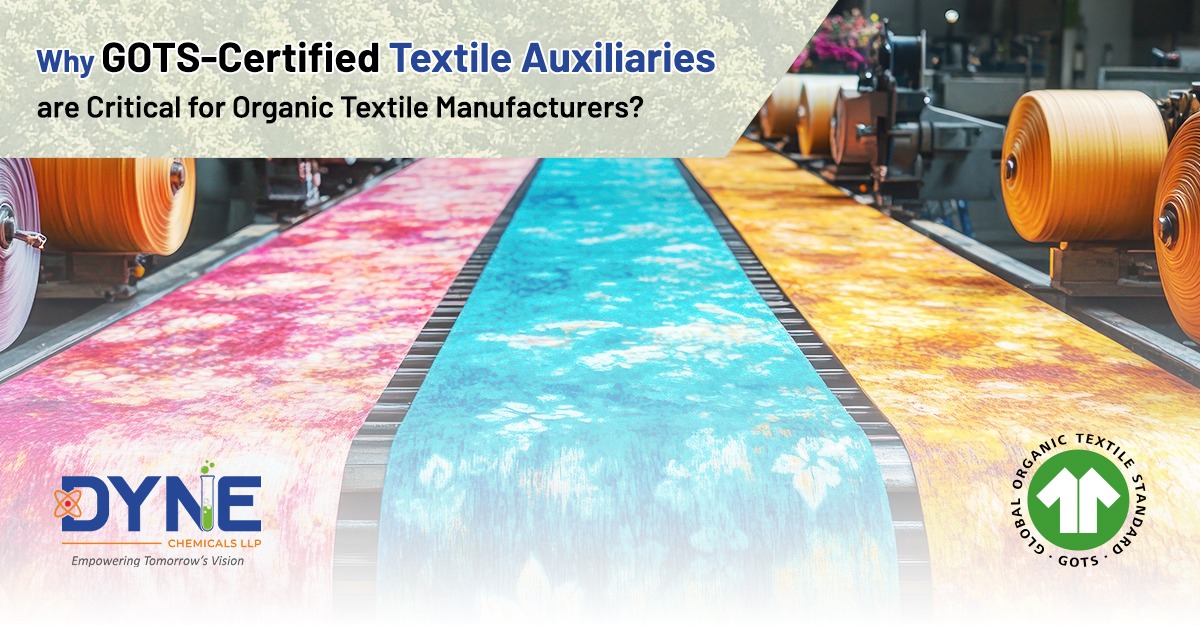It’s easy to overlook what lies beneath a certification label. In the case of GOTS (Global Organic Textile Standard), much of the industry conversation focuses on organic fibres. But what happens between harvest and hanger often holds the key to full compliance. One such crucial component is the use of GOTS certified textile auxiliaries, and they are far more critical than they’re often credited for.
The Organic Textile Landscape: High Growth, Higher Scrutiny
The global organic textile market is projected to reach USD 10.28 billion by 2027, growing at a CAGR of over 10%. India remains the largest producer of organic cotton, contributing over 51% of global supply (Textile Exchange, 2023). With growing demand from brands and retailers across Europe, Bangladesh, Vietnam, and Turkey, Indian manufacturers are increasingly required to demonstrate GOTS compliance in textiles across the value chain, not just at the raw material level.
For exporters targeting regulated markets, these requirements have become a baseline expectation.
Why GOTS Certification Matters for Textile Auxiliaries
Textile auxiliaries play an indispensable role in various stages of fabric processing – from pre-treatment to dyeing, printing, and finishing. These chemicals influence not only fabric performance but also determine whether the end product qualifies as truly organic.
Using organic textile chemicals that are non-compliant, even in trace amounts, can disqualify the product from certification. This makes GOTS certified textile auxiliaries a critical enabler for any manufacturer aiming to meet global standards for sustainable textile processing.
Benefits of GOTS Certified Auxiliaries
The decision to adopt GOTS approved chemical suppliers brings with it tangible operational and strategic advantages:
- Environmental compliance: GOTS prohibits a list of harmful substances (APEOs, heavy metals, formaldehyde, GMOs). Certified auxiliaries ensure alignment with those norms.
- Buyer confidence: Certifications are increasingly demanded by international brands seeking certified chemicals for sustainable fashion.
- Process reliability: These auxiliaries are rigorously tested, ensuring consistency across batches, a key requirement for large-scale buyers.
- Regulatory readiness: With growing pressure on effluent control and chemical safety, certified auxiliaries help reduce the burden on ETP systems and support audit readiness.
In short, the benefits of GOTS certified auxiliaries extend well beyond compliance, they enhance your business reliability and export readiness.
Policy Push and the Regional Imperative
India’s textile industry is undergoing rapid transformation under schemes like the National Technical Textiles Mission and PM MITRA Parks. Both initiatives aim to strengthen India’s position as a global textile hub by encouraging innovation, compliance, and sustainability.
At the state level, Zero Liquid Discharge (ZLD) norms in Gujarat, Tamil Nadu, and Maharashtra are pushing manufacturers to switch to eco-friendly textile chemicals that produce minimal effluent. The same shift is being mirrored in other regional markets like Bangladesh, Vietnam, and Turkey, where regulatory frameworks are aligning more closely with global environmental and social compliance norms.
This makes investment in textile auxiliaries for organic fabrics a strategic choice.
Dyne’s Approach: Compliance with Confidence
Dyne Chemicals offers a robust portfolio of Dyne GOTS certified textile auxiliaries covering key process requirements such as wetting, dispersing, softening, binding, and finishing. Designed to meet the expectations of organic textile producers, these solutions help eliminate risk, simplify audits, and accelerate market readiness.
Our products support seamless integration into existing production systems, whether you operate in India or export to compliance-heavy destinations like the EU or Southeast Asia. In every formulation, we prioritize both environmental safety and operational excellence.
A Practical Call for Alignment
Organic certification is no longer a marketing tool, it’s a market access requirement. And while much attention has been given to sourcing certified cotton, it’s the invisible inputs – your auxiliaries – that can decide whether your product makes it to the shelf or not.
For organic textile manufacturers—including knit and woven fabric processors, dye houses, garment exporters, and vertically integrated mills—seeking long-term export viability, alignment with GOTS at the chemical level is a foundation to build on.
If you’re looking to strengthen your compliance strategy with GOTS certified textile auxiliaries, connect with Dyne Chemicals today and explore solutions that combine sustainability with performance.

